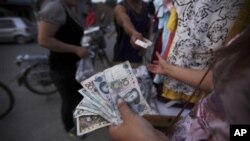The chief of the United Nations Conference on Trade and Development (UNCTAD) says pressuring China to revalue its currency could stall the global economic recovery. Supachai Panitchpakdii also expects Asia's currencies to continue rising against the dollar because of the capital flowing into the region.
UNCTAD Secretary-General Suapchai Panitchpakdii said Friday that international pressure on China to revalue its currency is counterproductive.
China faces pressure from the United States, Europe and Asia to allow the yuan to appreciate. Critics say China's government deliberately keeps the yuan undervalued to protect its export industries.
Supachai says forcing a rapid appreciation of the yuan, also called the renminbi, could cause turmoil in markets, and stall both China's economic growth and the global recovery.
"If you say we force currencies to go up by 20 percent - there's no control on speculation - it just destroys the whole market. If it happens, it would drive down economic growth in China and it would destroy the whole global recovery. So it's not only the question [of] renminbi and the U.S. and China. No, it's about global growth," he said.
Supachai, who attended a conference marking the 50th anniversary of Thailand's national airline, Thai Airways International, says regional currencies will continue to strengthen.
That is because foreign capital is flowing in to take advantage of the region's healthy economy.
"Fund flows into Asia would still be increasing at tremendous rates," added Supachai. "[It] will not be receding quickly. So balance of payments just strongly in surplus in Asia - reserves of more than $5 trillion in Asia. [That] all points in the direction of strong fundamentals, which would actually result in strong currencies. That is the order of the day."
Across Asia, export industries have been lobbying governments to take steps to weaken currencies.
Supachai says that one concern in Asia would be abrupt changes in currency movements, which could trigger market instability. But he also calls for Asia to be less dependent on exports. More attention, he says, needs to be raising domestic consumption and wages in line with productivity gains.
Supachai's comments came as China's leaders on Friday criticized the U.S. for demanding the yuan appreciate. They said China should not be made the scapegoat for the United States' economic problems.




